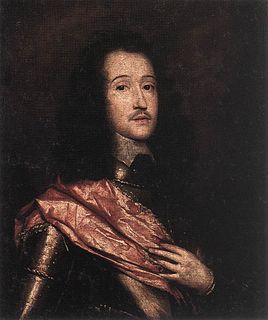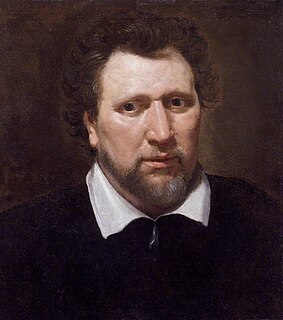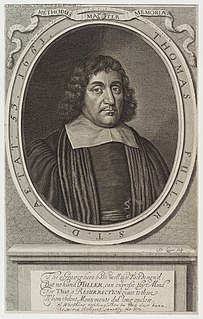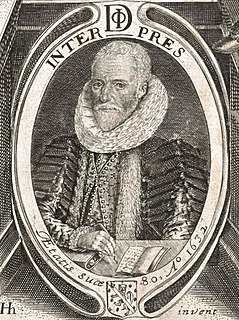Charles Aleyn (died about 1640), a historical poet in the reign of Charles I, was of Sidney Sussex College, Cambridge; [1] became usher to the celebrated Thomas Farnaby, at his school, in Goldsmith's Rents, and afterwards tutor to Sir Edward Sherburne, himself a poet. He died about 1640.
Aleyn seems to have been much esteemed and beloved by contemporaries of some eminence. To his first poem are prefixed commendatory verses in Latin, by Thomas May, and in English, by John Hall and Henry Blount; Sherburne and Edward Prideaux lent their names to the second. The poems are composed in stanzas of six lines—four alternate and two rhymes.

Alfred Edward Housman, usually known as A. E. Housman, was an English classical scholar and poet, best known to the general public for his cycle of poems A Shropshire Lad. Lyrical and almost epigrammatic in form, the poems wistfully evoke the dooms and disappointments of youth in the English countryside. Their beauty, simplicity and distinctive imagery appealed strongly to Edwardian taste, and to many early 20th-century English composers both before and after the First World War. Through their song-settings, the poems became closely associated with that era, and with Shropshire itself.

Richard Lovelace was an English poet in the seventeenth century. He was a cavalier poet who fought on behalf of the king during the Civil War. His best known works are "To Althea, from Prison", and "To Lucasta, Going to the Warres".

Benjamin Jonson was an English playwright and poet, whose artistry exerted a lasting impact upon English poetry and stage comedy. He popularised the comedy of humours. He is best known for the satirical plays Every Man in His Humour (1598), Volpone, or The Fox, The Alchemist (1610) and Bartholomew Fair (1614) and for his lyric and epigrammatic poetry. "He is generally regarded as the second most important English dramatist, after William Shakespeare, during the reign of James I."

Thomas Fuller was an English churchman and historian. He is now remembered for his writings, particularly his Worthies of England, published in 1662 after his death. He was a prolific author, and one of the first English writers able to live by his pen.

Sir William Davenant, also spelled D'Avenant, was an English poet and playwright. Along with Thomas Killigrew, Davenant was one of the rare figures in English Renaissance theatre whose career spanned both the Caroline and Restoration eras and who was active both before and after the English Civil War and during the Interregnum.
This article presents lists of the literary events and publications in 1782.

Thomas Carew was an English poet, among the 'Cavalier' group of Caroline poets.
Thomas Nabbes was an English dramatist.
William Habington was an English poet.

Philemon Holland was an English schoolmaster, physician and translator. He is known for the first English translations of several works by Livy, Pliny the Elder, and Plutarch, and also for translating William Camden's Britannia into English.

Paul Fleming, also spelt Flemming, was a German physician and poet.
Thomas May was an English poet, dramatist and historian of the Renaissance era.
Nationality words link to articles with information on the nation's poetry or literature.
Events from the 1590s in England.
Nationality words link to articles with information on the nation's poetry or literature.
Nationality words link to articles with information on the nation's poetry or literature.
Nationality words link to articles with information on the nation's poetry or literature.
Nationality words link to articles with information on the nation's poetry or literature.
Payne Fisher (1616–1693) was an English poet.
Sir Edward Sherburne (1618–1702) was an English poet, translator, and royalist of the seventeenth century.
This page is based on this
Wikipedia article Text is available under the
CC BY-SA 4.0 license; additional terms may apply.
Images, videos and audio are available under their respective licenses.







